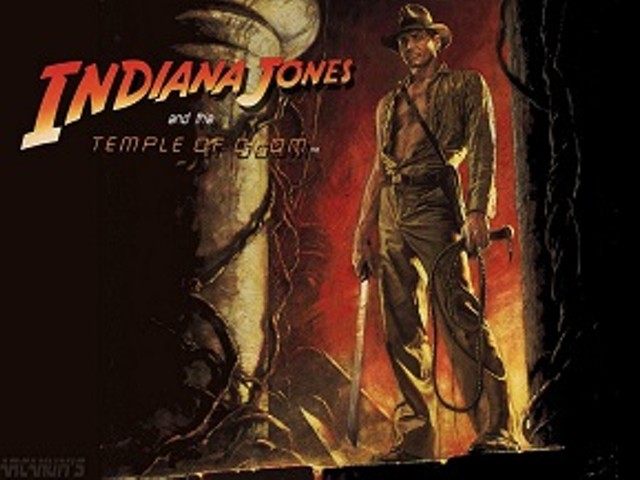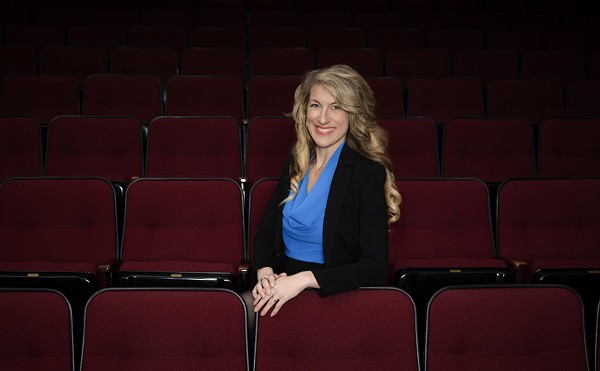Perhaps now that he's 50, Neil LaBute is too old to be considered the enfant terrible of playwrights. But there's something about LaBute's well-earned reputation as a crafter of cruel men and vindictive women who machine-gun each other with piercing dialogue that makes it impossible to imagine him softening or mellowing as a writer. This is the same man who establishes in the first ten minutes of "Helter Skelter" the domestic quietude of a husband and wife meeting for lunch at a favorite restaurant after a long day of Christmas shopping for their children, only to end it with that visibly pregnant wife grinning savagely with a table knife jammed in her belly, glad to have caused her philandering husband such great pain in a such a public way.
And the true horror of "Helter Skelter" is that in the moment she stabs herself, you're on her side. She's right. Or maybe she's merely better than — no, less odious than — her husband, who is a coward as afraid to commit himself emotionally to his adultery as he is to commit himself emotionally to his wife and children. Which of the couple has done more damage to their family at the end? Which is worse? "Helter Skelter" is gold-standard LaBute. It's a short, sharp terror of a one-act that grabs you, shakes you violently and then releases you to consider what its protagonists' marriage meant and what went wrong. The playwright forces you to invest yourself in his characters and their actions, even when said characters are plainly horrible people.
"Helter Skelter" was the standout piece in Just Desserts, a collection of LaBute one-acts presented by St. Louis Actors' Studio in 2011. LaBute gave the theater company a new piece for that show, thus fostering a working relationship between the playwright and Actors' Studio founder and producing director William Roth. That partnership has now borne the LaBute New Theater Festival, a month-long celebration of the art of playwriting and a proving ground for new work that opens this weekend at the Gaslight Theater with LaBute in attendance.
Roth portrayed the callous husband in "Helter Skelter" — a role he played with a slimy, me-first morality that slowly illuminated the emotional disconnect that hamstrung the character. In real life Roth is a gregarious fellow who values the emotional component theater requires and believes that fostering a sense of community and connectedness is required for any successful theater company. His enthusiasm for the value of doing the work is what spawned this new festival, and what drew LaBute to Actors' Studio — and to St. Louis.
"As Neil and I were working on Just Desserts, I floated the idea by him," Roth recounts. "I didn't have it fully figured out, but there are few playwrights working today with Neil's reach. He is so very dedicated to promoting theater that it seemed a natural fit for him to foster playwriting. It was equally important to have a high-school component to get young writers interested in writing plays."
LaBute says the notion was immediately a compelling one. "I enjoyed working with William Roth [on Just Desserts] and appreciated his love of theater and his desire to reach a broader audience with ideas like the collection of shorts we did together and this new festival," LaBute explains in a recent e-mail exchange with Riverfront Times. "I'm an advocate for theater, and I help out when and where I can."
LaBute's involvement was a great help indeed. Roth admits he had no idea what to expect when it came time to solicit submissions. "I sent out the press release with the rules of the festival, requested ten pages, and over the next few months we received over 250 submissions from all over North America," the producer says. "That is the power of Neil's influence with playwrights."
Of course that influence could have shown up in a few submissions as well, as writers aped LaBute's style in hopes of swaying the judges — and one judge in particular. "We had a few of those," Roth admits. "But for the most part, we received plays that covered the spectrum of ideas and dramatic situations. Neil's new short play, 'The Possible,' is leading the way in this festival, and I'm sure that helped keep the imitators at bay." (See sidebar for more information about the winning plays and authors.)
Besides, LaBute wasn't involved in the judging process: "I have read the winning entries and have written a piece for this festival, but I was not involved in the early stages of the selection process due to my own work schedule," he tells RFT. "And in some ways I prefer that — I don't like being a critic as much as I like being an advocate."
"The Possible" was a bit of a departure for LaBute. "It's a love story," he says.
Come again?
"Love, however, is never simple, or at least I'm not interested in the simple versions — I am interested in where love can take us, what we'll do to get it or to keep it or to get rid of it," he ventures. "I'm often trying to stretch the idea of 'love' as far as it can go, to see what it is and how it works."
LaBute describes "The Possible" as "the story of a woman who breaks up a relationship so that she can hopefully end up with one of the people from that relationship. Is that love? I don't know, but it's worth investigating, at least for ten pages or so."
Couched in those terms, love becomes a much more common element of LaBute's work. It lurks in the shadows of the often-horrible things his characters do to each one other, overlooked or ignored because of the overt violence that shocks and captivates. Our ravenous desire for the love of another human being is the defining characteristic of the needy Adam in The Shape of Things, who allows his new girlfriend to remake him emotionally, intellectually and physically. It's there in the dark undertow of Greg and Kent's friendship in 2008's reasons to be pretty, as two men destroy their own deep relationship in pursuit of emotional maturity (or something like it).
In LaBute's plays love is as potent a weapon as language, as sharp as regret and as hard to nail down as water. His characters ache for it, and from it.
reasons to be pretty recently spawned a sequel, Reasons to Be Happy, currently playing in New York with St. Louis native Jenna Fischer (The Office) in a starring role. The play revisits the same quartet of characters several years later, older but still struggling with love and relationships and each other. It has been very well reviewed in most quarters, but even when the critics praise his work, as the New York Times' Ben Brantley did, they tend to label LaBute a misanthrope.
For an alleged misanthrope, LaBute takes those sorts of charges in stride. "I think he probably meant on the page," the playwright allows. "And he's right in that I can be rough on my characters and my audiences because I want to keep pushing, to see what's out there and where we can still go with drama. I'm a pretty quiet person in life, but I am free and brave on the page. I don't think of myself as a misanthrope, because I do like and have great interest in my characters, but that doesn't mean I write them as lovely and wonderful people. They are as complicated as I am or the people around me who have influenced my writing."
It's that willingness to handle his characters — and his audience — with such callous compassion that distinguishes LaBute. Those final moments before the curtain rises on a LaBute play are endless, but they never last long enough. Soon enough you'll be dropped into a whirling torrent of invective and hateful venality, and it's all you can do to remain seated. Why not bolt before the first shot is fired?
Because when the lights come back up, you feel exhilarated. It's the damnedest thing, but once it's over you appreciate everything he has done to you because of what he has given you. All the pushing and the stretching and mutilating of lives is worth it in the end — and don't think for a second that LaBute doesn't know what he's putting you through, or that he doesn't care.
"It's a bit of a trick — I have to now find new ways to give audiences a jolt or to stir things up — but I enjoy that game," he confesses. "It's part of the job of being a writer: to surprise and confound and upend expectations (both in small and large ways). People don't want the same old thing, and they want to be taken on a journey, and that's what I try to do. But I also don't want to be trapped into doing that every time out, either. If I can make someone feel like it was worth it to spend their money and their time on one of my films or plays or books, then I've fulfilled my side of the bargain."
So all that pain and fear, all the bad vibes and awkward moments: Those are his gift to us. It's a sign of his respect for the audience that LaBute wants us to get our money's worth, even though you sometimes weaken halfway through digesting one of those barbed gifts and consider paying someone to make it stop.
As for his own preferences in entertainment and how they jibe with those of the critics, LaBute is characteristically forthcoming. "I like going to the theater or to the movies, so I'm already a game audience," he says. "I want people to succeed and to take me away for a few hours — I often feel that critics are frustrated by wanting to be creative and therefore just spend a lot of their time tearing down other work, and that doesn't help anyone. The best ones are instructive and a useful part of the process, but too often they feel like the unwanted aunt or uncle at Thanksgiving who didn't bring anything but has something bad to say about every dish on the table."
The aforementioned Reasons to Be Happy offers a case study in what LaBute deems bad criticism. Not long after our interview with the playwright, David Cote closed a negative and often insulting review of the play in Time Out New York with a "Wish for the future: Reasons to Be Silent." The jab elicited a response from a commenter who quoted George Steiner ("a critic casts a eunuch's shadow") and signed off with a jaunty, "Keep enjoying the free tickets while they last."
The author ID'ed himself as "Neil LaBute."
Was that really you, Neil? The comment certainly carries the plangent tang of bona fide LaBute: the passion for the act of communication, the anger, the verbal dexterity of someone who believes in the primacy of language.
Asked if he'd like to own up, LaBute admits nothing but reserves the right to weigh in on comments threads. "I have no comment or interest in that subject, but I have responded to critics before and will again, I'm sure. Criticism serves a certain kind of purpose in the artistic process, but it is not the last word in that process, and this idea of 'comment' sections now allows for readers and artists to critique the critics and to keep the dialogue alive. I am all for it."
As LaBute himself had previously put it to RFT, "I love words, so I try to use them all. I don't think there's any word or any subject that isn't fit for the stage, and I will continue to push that idea for as long as I'm a viable voice in American theater. People may not like what they hear, but there is nothing that can't be said — it's not always said well, but anything can be written about and discussed on the stage.
"If not there, then where else?"






